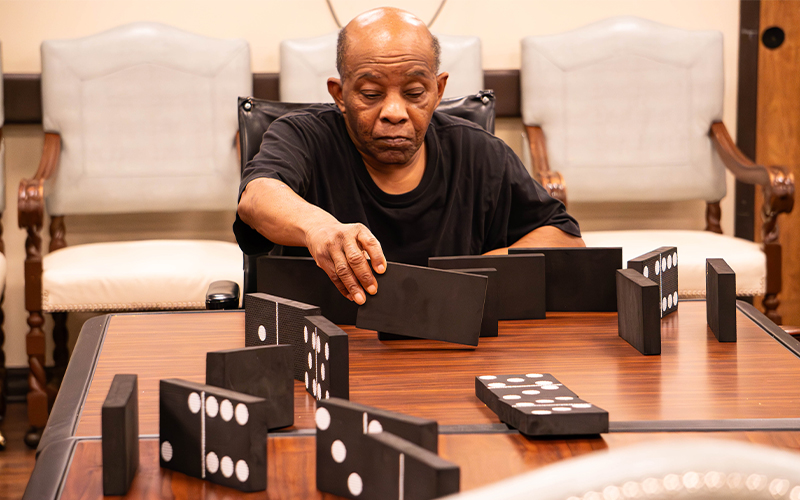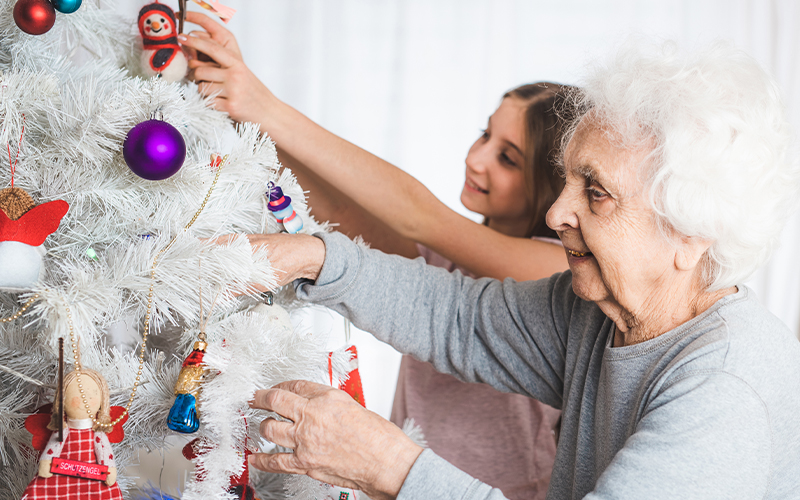Holidays and Dementia: Tips for Making the Holidays More Enjoyable
The holidays bring a unique set of challenges for people living with dementia and their caregivers. The disruption of routines creates opportunities for challenging expressions.

You can find joy in the season. Learning to be prepared, setting realistic expectations, and saying no can help caregivers navigate the holiday season and find joy in celebrating the holidays together with friends and family.
Dementia is a progressive disease. Every year, the holidays will be different as your loved one progresses through the different stages of the disease.
““We accommodate the disease because they can’t accommodate it,” says Hollie Glover, director of education and family support services at James L. West Center for Dementia Care.
Gifts for a person with dementia
When thinking about a gift for a loved one with dementia, think about the things that give them joy at their current stage in the disease.
Everyone has a soundtrack for their life, most often developed between the ages of 10 and 25. Look back at what the popular music was during that time in your loved one’s life and look for CDs and audio files from that time frame.
A gift with therapeutic value that connects to their past vocation or a hobby may spark joy and hours of purpose and meaning.
Sensory stimulation pads, pillows or blankets provide tactile stimulation for those living with dementia and help calm fidgeting. The pillows or blankets feature zippers, buttons, ties, and velcro that keep the hands busy opening and closing, buttoning and unbuttoning.

Preparing friends and family
Caregivers and other family members who spend more time with their loved one with dementia should prepare visitors and family members who may be traveling in for the holidays.
Let them know what to expect. Tell them clearly how your loved one has changed emotionally, mentally and physically.
Before the visit, share basic communication strategies, such as avoiding using the word “remember,” and ways that you manage challenging behaviors or expressions.
Recognize that some of the changes may be difficult for family or friends to deal with. They may be nervous and not know what to say or be afraid to be left alone with the loved one.
Getting ready for the holidays
When your loved one is living with dementia, it’s best to keep the celebration simple. Too much stimulation can be overwhelming, causing big emotions and challenging expressions.
She suggests finding ways to include your loved one in the preparations for the celebrations with simple tasks that can be easily modified for different skill levels.
“It doesn’t have to be perfect,” Glover says. “Let them help and feel useful.”

Gathering with your family
Keep your celebration plans simple. Give yourself time to rest, and allow others to help you.
“Have a plan B,” Glover says. “Many times things won’t go as planned, so have a back-up plan.”
The stimulus of the holidays – decorations, parties, extra people, presents – can quickly become overwhelming and may cause your loved one to respond in more challenging ways.
Be realistic in your expectations and planning. Be flexible, and be honest with your family about what your loved one can and can’t do.
Celebrating the holidays after a move to a community
If your loved one is living in a community, carefully consider whether you will celebrate in their new home or if you’ll bring them home for the festivities.
If you decide to celebrate in your loved one’s new home, take advantage of the different areas available in the community. Plan to participate in any planned holiday events with your loved one so they are in their comfort zone.

Recognizing and reducing your stress
As a caregiver, you know your loved one the best. Plan early. Be realistic. Learn to say no.
There’s nothing you have to attend or anything you have to do during the holidays, even if it’s something you’ve done forever.
Be on the look-out for signs of stress. Fatigue, sleeplessness, and headaches may be a sign you’ve taken on too much during the holidays. Muscle tension or backaches, increased anxiety, gastrointestinal issues and increased heart rate or blood pressure are more signs you’ve taken on too much.
The key to a joyful and successful holiday celebration is being realistic, flexible and being in tune to your loved one’s needs.
For more tips or links to helpful resources, check out James L. West Center for Dementia Care’s Holidays and Dementia training on demand.


 Sign in
Sign in

